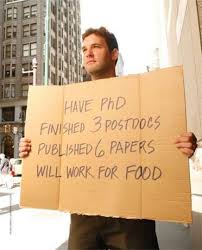 I thank Peter Christiansen for sending me this article from The Economist: The Disposable Academic: Why Doing a Ph.D. is Often a Waste of Time.
I thank Peter Christiansen for sending me this article from The Economist: The Disposable Academic: Why Doing a Ph.D. is Often a Waste of Time.After reading the article, I posted this response on The Economist's website:
I speak with some knowledge here: I hold a Ph.D. from the University of California, Berkeley specializing in evaluation of education and subsequently have been on the faculty of four graduate schools, including Berkeley.
In my view, the key to abbreviating the length of a Ph.D.and post-doc program is to eliminate the arcana, of which there are mountains. Primarily teach the tools required for excellent research: e.g., research design, how to critique research, and yes, expose the students to core cutting-edge areas in a discipline to help them identify their desired research focus. Such training could, in my judgment, most time-effectively be learned if the program were just two years long.
As important, I'd cut by 80% the number of slots in Ph.D. programs, referring the other applicants to equally abbreviated, practically-oriented doctorates (e.g., Psy.D, Ed.D.) taught not by Ph.D.s (disproportionately esoterica-focused theoreticians) but by master practitioners with the rare ability to convey their mastery to students.
So much university research is known, apriori, to be of trivial value, certainly known upfront to be cost-ineffective expenditures of taxpayer dollars--and much of such research indeed is funded by the taxpayer. Especially in these tough economic times, it would be wiser to allow taxpayers to retain their money than to fund yet another study on, for example, the deconstruction of the use of the doppelganger in 19th century literature.
UPDATE: Upon reading this post, a reader forwarded me this even more powerful caution against pursuing a Ph.D.
And I'm reminded of an article on the topic that now, five years later, still remains top-of-mind for me.








6 comments:
I am listening to similar topics on your kgoradio show...
I have too many of my own sad tales to tell here. :-)
but... regarding the woman's email (?) you read on the air (yes, we know "on-the-air is occupational jargon). If she hadn't begun with "I spoke to you at.." (I forget the exact phrasing), I'd more suspect she's a troll (fake, hoax, joker, leg-puller)
PS. these comments I'm adding here are off the cuff, not a prepared communique.
It was definitely not a troll. She was writing to excoriate me for advising her to get a master's in public administration.
So Marty, when are you going to establish a virtual university with all the traits you describe? If anyone could pull it off, you could. :-)
By the way, if you do start a virtual university, maybe you could incorporate Cisco's Public Telepresence -- we use Telepresence at work and it really does make it seem like you are in the same room with someone.
Seraphim, I've spent the last few months trying: pitching Gates Foundation, Google, Apple U, Kauffman Foundation, an undersecretary at the U.S. Office of Education, Jimmy Wales (founder of Wikipedia) the head of the regional accreditation commission, Apple, a very senior person at U.C. Berkeley, the California State University, the University of Phoenix, the president of Napa Valley College, top editors at the Chronicle of Higher Education and of Inside Higher Education, etc. Mainly no response despite my pushing. The meetings I've had generated agreement that what I propose is very important, but no one has said they want to be involved.
I looked into getting a PhD in something like math or computers (I have a masters in math, now), so I asked around to some PhD's in the mathematical modeling department I used to work in.
One guy was a contractor, and said if he had to do it over, he would have stopped at a masters and he would have made a lot more money in his career for how long it took to continue on for the PhD and being poor all those years. Although, I doubt he would have been hired where I worked if he didn't have a PhD.
Another guy, who was my manager for a short while in fact, said as long as you get a good adviser to work with, it's not a big deal, and isn't as insurmountable as some people imagine.
One guy I was interviewing sort of scuffed at having his and said it's no big deal, not that hard (he was an immigrant, not Asian).
Now they've hired several Chinese PhDs, and I don't understand how they can get a PhD in the USA and barely can write an e-mail or speak English (they speak to each other very well, however). Management did recognize the problem, though and started sending some of them to English classes.
I asked one of my professors about it while I was getting my masters, and he said the PhD was like a union card. You really only need a masters to do the work, but they look for the union card to let people in.
I also suppose it's like the actuarial field I used to be in. It keeps the pool of candidates smaller by requiring more credentials, so few can get to that level.
The result of this is I just stayed in my well-paying job and didn't pursue the PhD. A few years later I have much more money saved in the bank than I would have spent on tuition and books ... and no guarantee of making any more.
Post a Comment